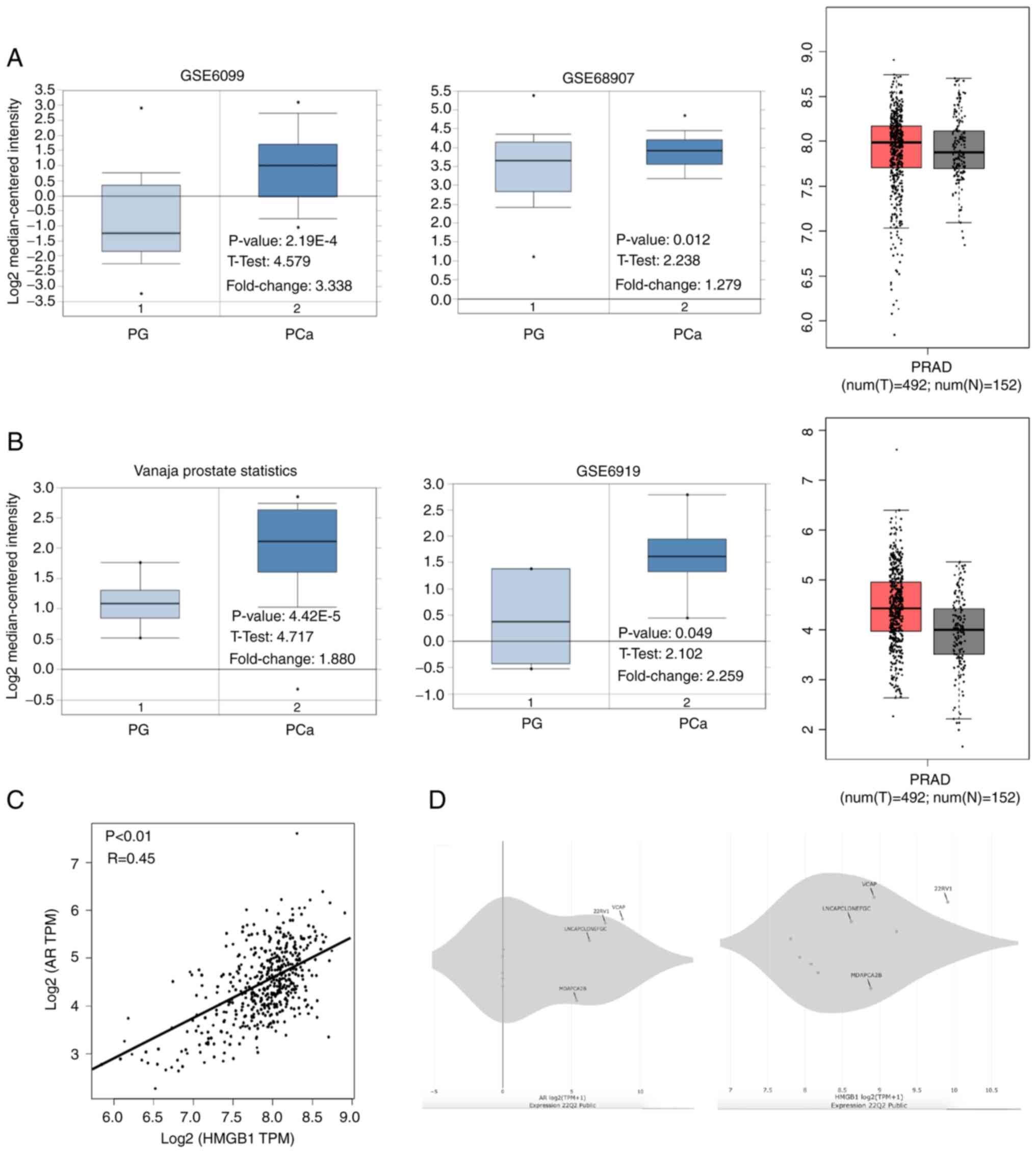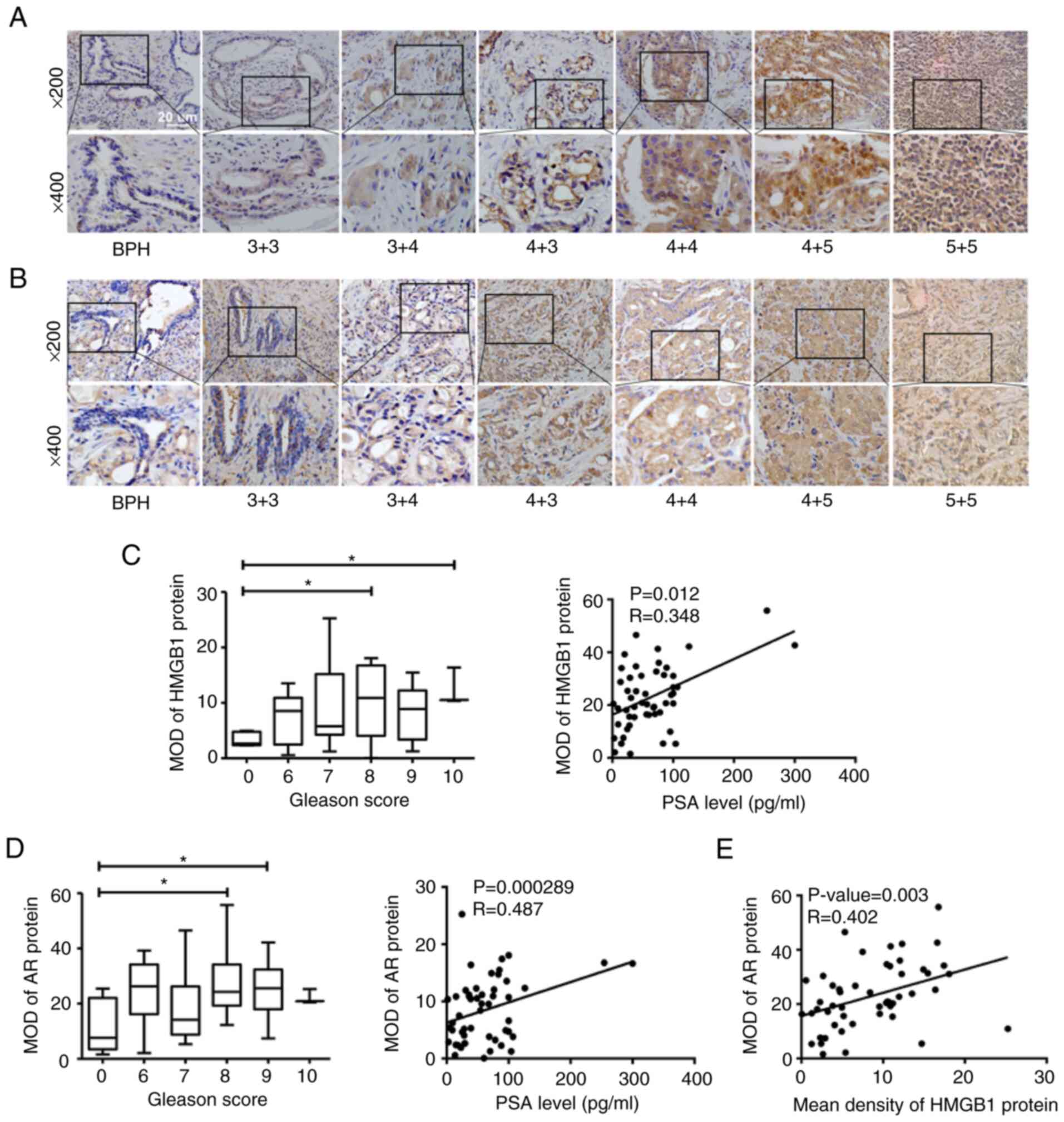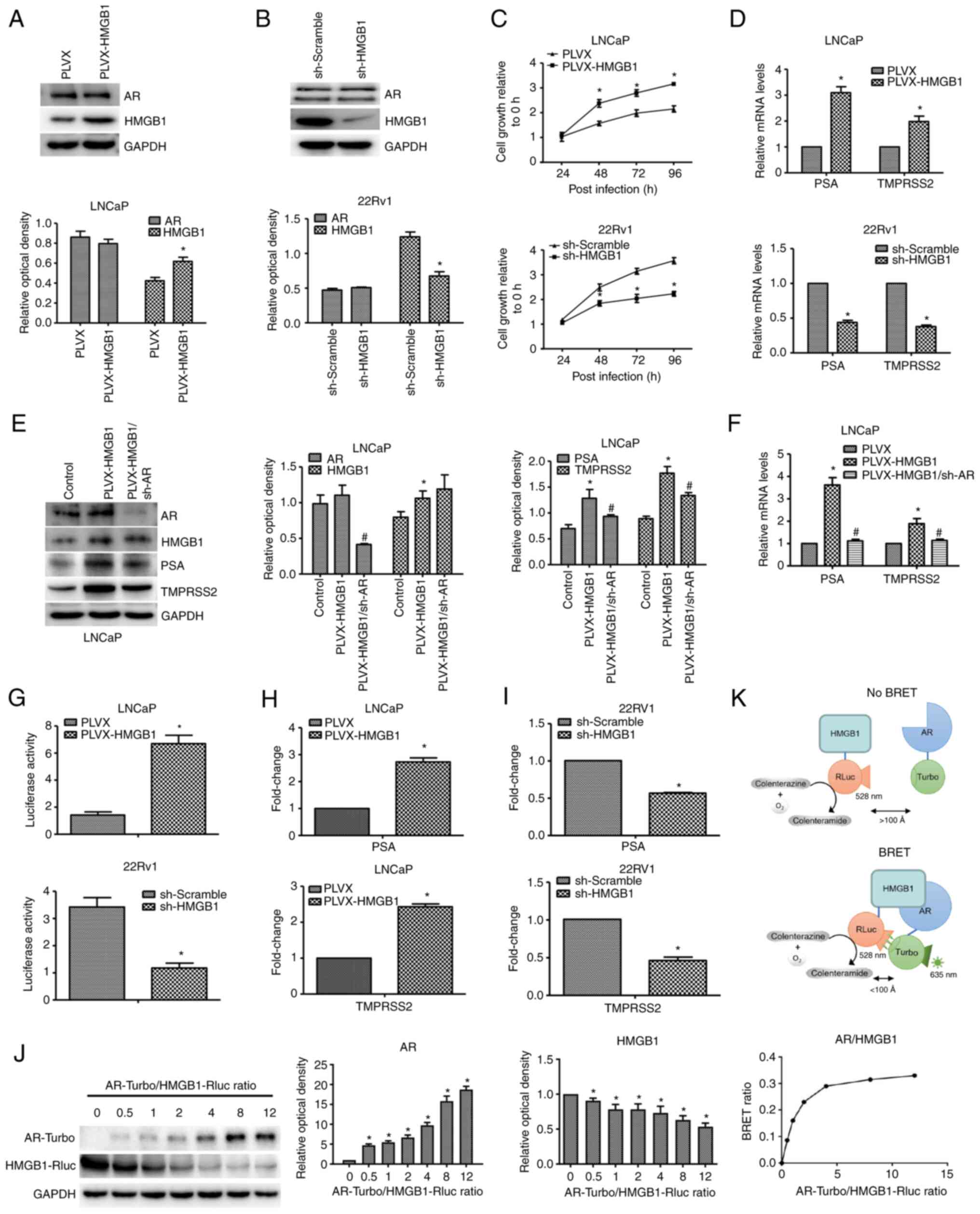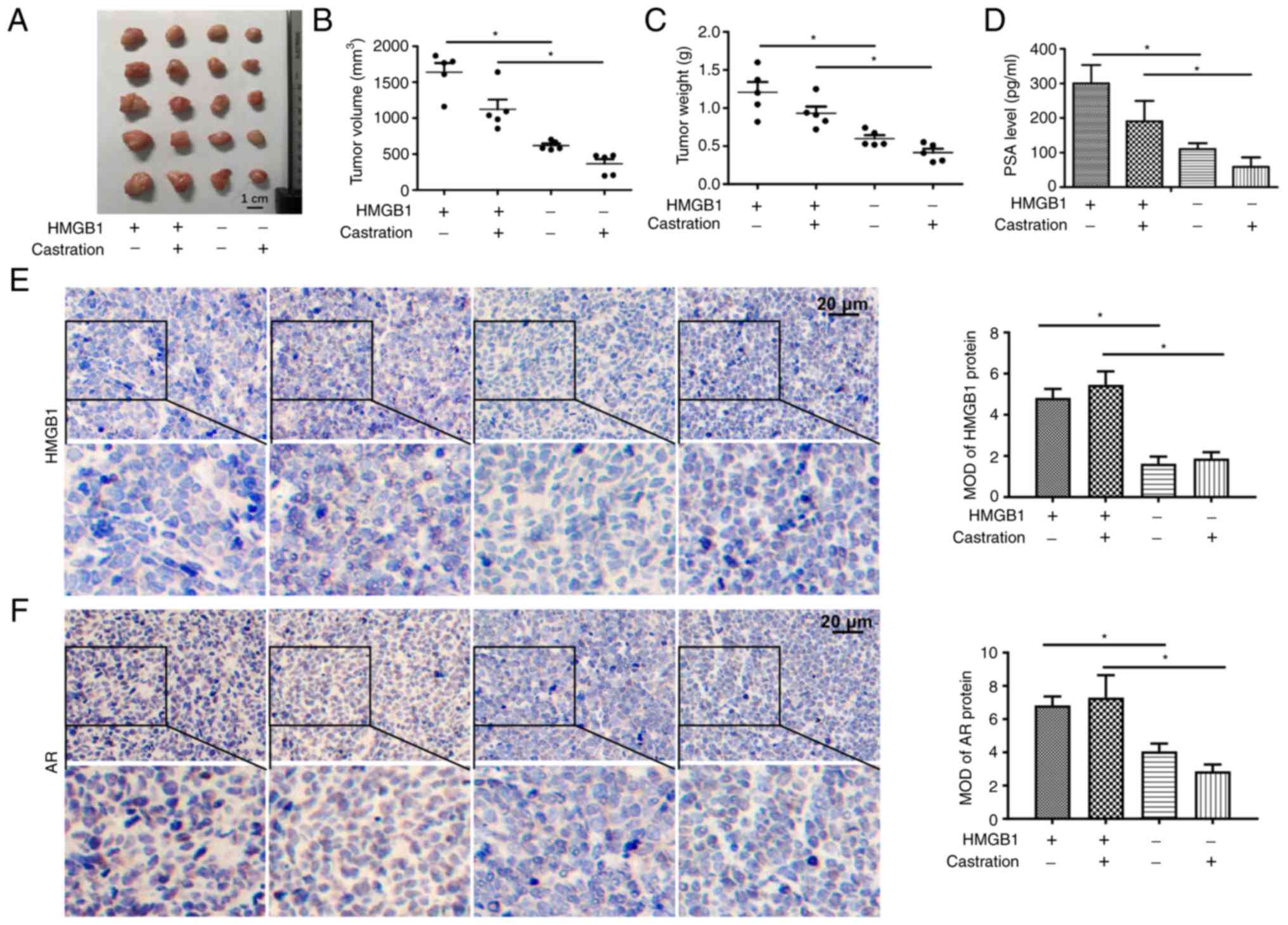|
1
|
Sung H, Ferlay J, Siegel RL, Laversanne M,
Soerjomataram I, Jemal A and Bray F: Global cancer statistics 2020:
GLOBOCAN estimates of incidence and mortality worldwide for 36
cancers in 185 countries. CA Cancer J Clin. 71:209–249. 2021.
View Article : Google Scholar : PubMed/NCBI
|
|
2
|
Glina S, Rivero MA, Morales A and
Morgentaler A: Studies on prostatic cancer I. The effect of
castration, of estrogen and of androgen injection on serum
phosphatases in metastatic carcinoma of the prostate by Charles
Huggins and Clarence V. Hodges. J Sex Med. 7:640–644. 2010.
View Article : Google Scholar : PubMed/NCBI
|
|
3
|
Guan W, Li F, Zhao Z, Zhang Z, Hu J and
Zhang Y: Tumor-associated macrophage promotes the survival of
cancer cells upon docetaxel chemotherapy via the
CSF1/CSF1R-CXCL12/CXCR4 axis in castration-resistant prostate
cancer. Genes (Basel). 12:7732021. View Article : Google Scholar : PubMed/NCBI
|
|
4
|
Kluetz PG, Ning YM, Maher VE, Zhang L,
Tang S, Ghosh D, Aziz R, Palmby T, Pfuma E, Zirkelbach JF, et al:
Abiraterone acetate in combination with prednisone for the
treatment of patients with metastatic castration-resistant prostate
cancer: U.S. Food and drug administration drug approval summary.
Clin Cancer Res. 19:6650–6656. 2013. View Article : Google Scholar : PubMed/NCBI
|
|
5
|
Scher HI, Fizazi K, Saad F, Taplin ME,
Sternberg CN, Miller K, de Wit R, Mulders P, Chi KN, Shore ND, et
al: Increased survival with enzalutamide in prostate cancer after
chemotherapy. N Engl J Med. 367:1187–1197. 2012. View Article : Google Scholar : PubMed/NCBI
|
|
6
|
Egan A, Dong Y, Zhang H, Qi Y, Balk SP and
Sartor O: Castration-resistant prostate cancer: Adaptive responses
in the androgen axis. Cancer Treat Rev. 40:426–433. 2014.
View Article : Google Scholar : PubMed/NCBI
|
|
7
|
van Royen ME, van Cappellen WA, de Vos C,
Houtsmuller AB and Trapman J: Stepwise androgen receptor
dimerization. J Cell Sci. 125:1970–1979. 2012.PubMed/NCBI
|
|
8
|
Tran C, Ouk S, Clegg NJ, Chen Y, Watson
PA, Arora V, Wongvipat J, Smith-Jones PM, Yoo D, Kwon A, et al:
Development of a second-generation antiandrogen for treatment of
advanced prostate cancer. Science. 324:787–790. 2009. View Article : Google Scholar : PubMed/NCBI
|
|
9
|
Ryan CJ, Smith MR, Fizazi K, Saad F,
Mulders PF, Sternberg CN, Miller K, Logothetis CJ, Shore ND, Small
EJ, et al: Abiraterone acetate plus prednisone versus placebo plus
prednisone in chemotherapy-naive men with metastatic
castration-resistant prostate cancer (COU-AA-302): Final overall
survival analysis of a randomised, double-blind, placebo-controlled
phase 3 study. Lancet Oncol. 16:152–160. 2015. View Article : Google Scholar : PubMed/NCBI
|
|
10
|
Xu D, Zhan Y, Qi Y, Cao B, Bai S, Xu W,
Gambhir SS, Lee P, Sartor O, Flemington EK, et al: Androgen
receptor splice variants dimerize to transactivate target genes.
Cancer Res. 75:3663–3671. 2015. View Article : Google Scholar : PubMed/NCBI
|
|
11
|
Xue J, Suarez JS, Minaai M, Li S, Gaudino
G, Pass HI, Carbone M and Yang H: HMGB1 as a therapeutic target in
disease. J Cell Physiol. 236:3406–3419. 2021. View Article : Google Scholar : PubMed/NCBI
|
|
12
|
Jung AR, Kim GE, Kim MY, Ha US, Hong SH,
Lee JY, Kim SW and Park YH: HMGB1 promotes tumor progression and
invasion through HMGB1/TNFR1/NF-κB axis in castration-resistant
prostate cancer. Am J Cancer Res. 11:2215–2227. 2021.PubMed/NCBI
|
|
13
|
Chou YE, Yang PJ, Lin CY, Chen YY, Chiang
WL, Lin PX, Huang ZY, Huang M, Ho YC and Yang SF: The impact of
HMGB1 polymorphisms on prostate cancer progression and
clinicopathological characteristics. Int J Environ Res Public
Health. 17:72472020. View Article : Google Scholar : PubMed/NCBI
|
|
14
|
Das D, Peterson RC and Scovell WM: High
mobility group B proteins facilitate strong estrogen receptor
binding to classical and half-site estrogen response elements and
relax binding selectivity. Mol Endocrinol. 18:2616–2632. 2004.
View Article : Google Scholar : PubMed/NCBI
|
|
15
|
Powell E and Xu W: Intermolecular
interactions identify ligand-selective activity of estrogen
receptor alpha/beta dimers. Proc Natl Acad Sci USA.
105:19012–19017. 2008. View Article : Google Scholar : PubMed/NCBI
|
|
16
|
Bjerregaard-Olesen C, Ghisari M, Kjeldsen
LS, Wielsøe M and Bonefeld-Jørgensen EC: Estrone sulfate and
dehydroepiandrosterone sulfate: Transactivation of the estrogen and
androgen receptor. Steroids. 105:50–58. 2016. View Article : Google Scholar : PubMed/NCBI
|
|
17
|
Mafuvadze B, Liang YY and Hyder SM:
Cholesterol synthesis inhibitor RO 48-8071 suppresses
transcriptional activity of human estrogen and androgen receptor.
Oncol Rep. 32:1727–1733. 2014. View Article : Google Scholar : PubMed/NCBI
|
|
18
|
Tomlins SA, Mehra R, Rhodes DR, Cao X,
Wang L, Dhanasekaran SM, Kalyana-Sundaram S, Wei JT, Rubin MA,
Pienta KJ, et al: Integrative molecular concept modeling of
prostate cancer progression. Nat Genet. 39:41–51. 2007. View Article : Google Scholar : PubMed/NCBI
|
|
19
|
Singh D, Febbo PG, Ross K, Jackson DG,
Manola J, Ladd C, Tamayo P, Renshaw AA, D'Amico AV, Richie JP, et
al: Gene expression correlates of clinical prostate cancer
behavior. Cancer Cell. 1:203–209. 2002. View Article : Google Scholar : PubMed/NCBI
|
|
20
|
Yu YP, Landsittel D, Jing L, Nelson J, Ren
B, Liu L, McDonald C, Thomas R, Dhir R, Finkelstein S, et al: Gene
expression alterations in prostate cancer predicting tumor
aggression and preceding development of malignancy. J Clin Oncol.
22:2790–2799. 2004. View Article : Google Scholar : PubMed/NCBI
|
|
21
|
Vanaja DK, Cheville JC, Iturria SJ and
Young CY: Transcriptional silencing of zinc finger protein 185
identified by expression profiling is associated with prostate
cancer progression. Cancer Res. 63:3877–3882. 2003.PubMed/NCBI
|
|
22
|
Tian Y, Zhao L, Zhang H, Liu X, Zhao L,
Zhao X, Li Y and Li J: AKR1C3 overexpression may serve as a
promising biomarker for prostate cancer progression. Diagn Pathol.
9:422014. View Article : Google Scholar : PubMed/NCBI
|
|
23
|
Chen J, Xia Y, Peng Y, Wu S, Liu W, Zhang
H, Wang T, Yang Z, Zhao S and Zhao L: Analysis of the association
between KIN17 expression and the clinical features/prognosis of
epithelial ovarian cancer, and the effects of KIN17 in SKOV3 cells.
Oncol Lett. 21:4752021. View Article : Google Scholar : PubMed/NCBI
|
|
24
|
Yang Y, Liu T, Hu C, Xia H, Liu W, Chen J,
Wu S, Jiang Y, Xu Y, Liu W and Zhao L: Ferroptosis inducer erastin
downregulates androgen receptor and its splice variants in
castration-resistant prostate cancer. Oncol Rep. 45:252021.
View Article : Google Scholar : PubMed/NCBI
|
|
25
|
Livak KJ and Schmittgen TD: Analysis of
relative gene expression data using real-time quantitative PCR and
the 2(−Delta Delta C(T)) method. Methods. 25:402–408. 2001.
View Article : Google Scholar : PubMed/NCBI
|
|
26
|
Chen J, Zhao S, Tan W, Wang T, Wu S, Wang
C, Jiang Y, Zhou T, Zhang Z and Zhao L: Attenuated Salmonella
carrying plasmid co-expressing HPV16 L1 and siRNA-E6 for cervical
cancer therapy. Sci Rep. 11:200832021. View Article : Google Scholar : PubMed/NCBI
|
|
27
|
Li T, Gui Y, Yuan T, Liao G, Bian C, Jiang
Q, Huang S, Liu B and Wu D: Overexpression of high mobility group
box 1 with poor prognosis in patients after radical prostatectomy.
BJU Int. 110:E1125–E1130. 2012. View Article : Google Scholar : PubMed/NCBI
|
|
28
|
Wang C, Peng G, Huang H, Liu F, Kong DP,
Dong KQ, Dai LH, Zhou Z, Wang KJ, Yang J, et al: Blocking the
feedback loop between neuroendocrine differentiation and
macrophages improves the therapeutic effects of enzalutamide
(MDV3100) on prostate cancer. Clin Cancer Res. 24:708–723. 2018.
View Article : Google Scholar : PubMed/NCBI
|
|
29
|
Ogawa S, Inoue S, Watanabe T, Hiroi H,
Orimo A, Hosoi T, Ouchi Y and Muramatsu M: The complete primary
structure of human estrogen receptor beta (hER beta) and its
heterodimerization with ER alpha in vivo and in vitro. Biochem
Biophys Res Commun. 243:122–126. 1998. View Article : Google Scholar : PubMed/NCBI
|
|
30
|
Cao B, Qi Y, Zhang G, Xu D, Zhan Y,
Alvarez X, Guo Z, Fu X, Plymate SR, Sartor O, et al: Androgen
receptor splice variants activating the full-length receptor in
mediating resistance to androgen-directed therapy. Oncotarget.
5:1646–1656. 2014. View Article : Google Scholar : PubMed/NCBI
|
|
31
|
Dong Y, Lee SO, Zhang H, Marshall J, Gao
AC and Ip C: Prostate specific antigen expression is down-regulated
by selenium through disruption of androgen receptor signaling.
Cancer Res. 64:19–22. 2004. View Article : Google Scholar : PubMed/NCBI
|
|
32
|
Collak FK, Demir U and Sagir F: YAP1 is
involved in tumorigenic properties of prostate cancer cells. Pathol
Oncol Res. 26:867–876. 2020. View Article : Google Scholar : PubMed/NCBI
|


















